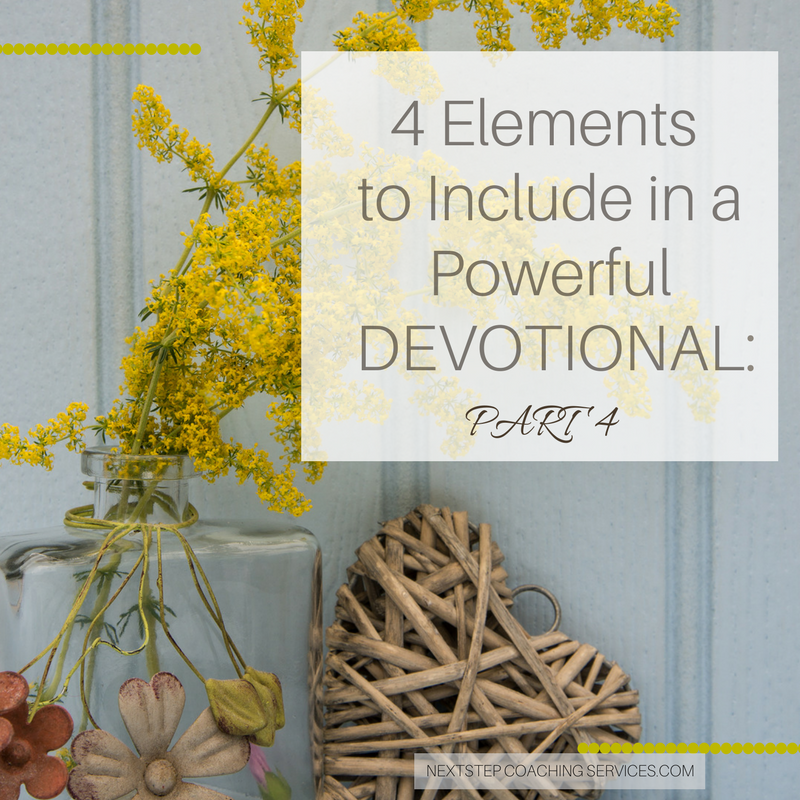4 Elements to Include in a Powerful Devotional: Part 4
A powerful devotional is centered on the power of Scripture. As we’ve been learning how to write a devotional, we’ve finally come to the section of exploring Scripture.
To review – we’ve been discussing these four elements of a powerful devotional:
- Introduction
- Addressing Your Reader’s Need
- Exploration of Scripture
- Conclusion
In the first post, I included a sample devotional that we’ll continue to use throughout this series (click here for sample devotional).
Let’s look at portions of that sample. The following paragraph transitions into my exploration of Scripture.
But deep down this doesn’t ring true. We desire to display both inner and outer beauty. What we long for is someone to be enchanted with our entire being, our very essence.
Then I move into the paragraph where I bring in Scripture. I am showing my reader what I’ve discovered about God’s perspective on the situation, problem, or need. Let’s look again at my sample.
What if we recognize this longing as a God-given desire that distinguishes our feminine hearts? When I turn this over in my mind and heart, I find something incredible. Our heavenly Father is the one who both created and fulfilled the longing of our hearts. God sees us inside and out, and he’s not disappointed or critical. He will “take great delight in you” and “rejoice over you with singing.” (Zephaniah 3:17).
I am showing my reader the solution to my questions about feeling beautiful. I realize that my true desire is not to be just physically beautiful, but beautiful inside and out. And I want someone to acknowledge that in me. The verse from Zephaniah shows me that God is the One who meets that desire.
Since this was such a short devotional, I only have one paragraph presenting a biblical truth. In a longer devotional, I would include several paragraphs.
Here are a few guidelines for this section of your devotional.
Include the actual words of Scripture
I think it’s important to include the actual words of Scripture, along with unpacking biblical principles. Reading the writings of other Christians certainly encourages our growth as Christians, but it can’t be the stopping point. I want my reader to take the next step – the one where she opens her Bible, prays about her situation, and learns to find solutions in God’s Word.
Include one key verse
One key verse is all you need for a powerful devotional. It’s amazing what people actually remember – or more importantly, don’t remember. One powerful key verse, along with an explanation, is something our readers can hold on to, write down, tuck away in their hearts and pockets.
It is very common to include a list of other similarly related verses at the end of a devotional. I think that’s a good practice and one that allows your reader to explore a topic.
Use tools to help you explore Scripture
Here are some links I use to help me study Scripture.
Study Bible – a study Bible includes notes at the bottom of the page, elaborating on certain verses, and often giving cross references to similar Scripture.
You probably won’t include everything you’ve uncovered in your research, but your careful choice of which parts to include will result in a powerful devotional.
Present a solution
We want to present a solution to the “felt need” or problem we’ve presented in our devotional. We share in this section of exploring Scripture how God truly is the One to turn to, no matter what the problem is.
One caution here: every solution grounded in biblical truth does not need to be presented as if you have everything all figured out and tied up in a neat little package. It’s okay to leave room for more questions. I find that’s often how life really is, isn’t it?
For example, in my sample, I write that God understands, that He sees my desire to be beautiful. And I sit and rest with that answer. It doesn’t mean that I’m sometimes still not too thrilled to wear a bathing suit or wish my jeans were a smaller size. I want to show victorious Christian living, but to me that means I’m seeking God and walking in obedience, not perfection.
Next week will be the fifth and final blog post in this series. We’ll look at how to write the conclusion for a devotional.
Continue to join us in this series by subscribing to Next Step Coaching Services weekly blog posts.








Great series, Melodie. Thank you for sharing your wisdom with us.
Hi Lyli – Thank you! I’m glad you joined us! And hope your writing journey is continuing to go well! Melanie
Thank you for your easy to understand instructions they are very helpful.
Thank you so much, Helena! I’m glad they’ve been a help!